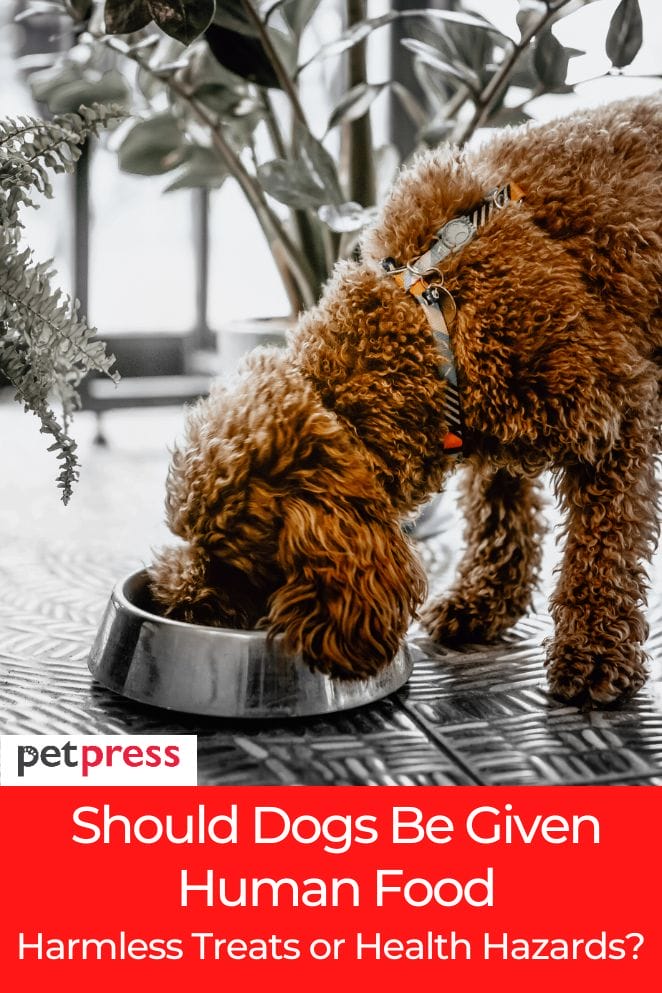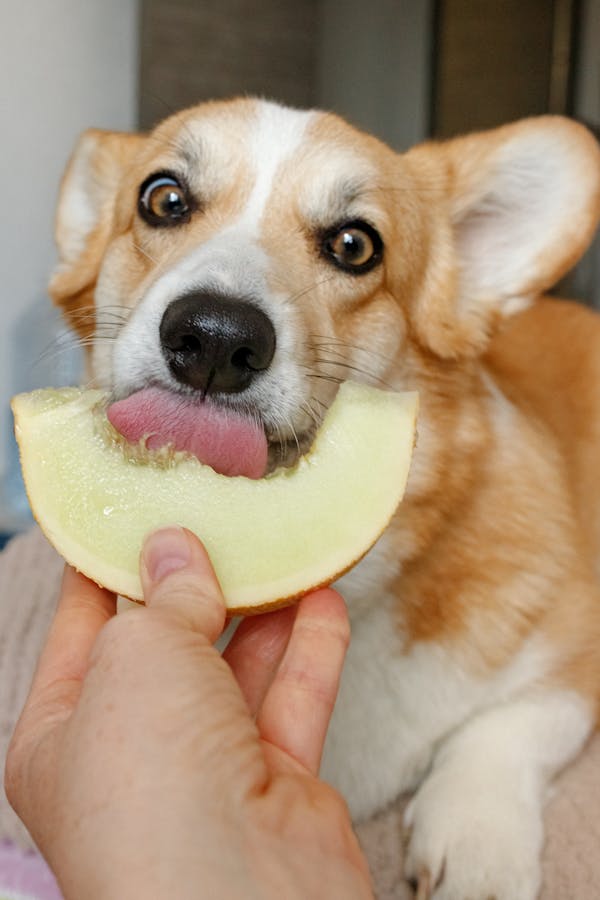
As dog owners, we often find it hard to resist those puppy-dog eyes staring at us during mealtime.
It’s tempting to share a bite of our food with our furry companions, but is it really safe?
While some human foods can be harmless or even beneficial, others pose significant risks to our dogs.
In this blog post, we’ll explore the dangers of feeding human food to dogs, their nutritional needs compared to ours, and when it might be okay to offer certain human foods.
Let’s dive into the facts and help you make the best choices for your pet’s health.
The Dangers of Human Food for Dogs
Feeding dogs human food may seem harmless, but it can actually pose serious health risks.
Many foods that are safe for humans can be toxic or dangerous for dogs.
Here are some common dangers:
Toxic foods
Some everyday foods are toxic to dogs, even in small amounts:
- Chocolate contains theobromine, which dogs can’t metabolize properly, leading to heart issues, seizures, or even death.
- Onions and garlic can damage a dog’s red blood cells, leading to anemia.
- Grapes and raisins can cause kidney failure, even in small quantities.
- Xylitol, a sweetener found in gum and baked goods, can cause a rapid drop in blood sugar and liver failure in dogs.
Digestive issues
Many human foods are too rich or fatty for a dog’s digestive system. This can cause:
- Vomiting and diarrhea: Dogs aren’t used to the spices, fat, or seasoning found in human food, leading to stomach upsets.
- Pancreatitis: Foods high in fat, like bacon or fried foods, can inflame a dog’s pancreas, causing severe pain and vomiting.
Choking hazards
Some human foods, like cooked bones or small pieces of food, can be dangerous for dogs.
Cooked bones can break into sharp pieces, which may splinter and cause blockages or injuries in a dog’s throat or digestive system.
It’s best to avoid giving your dog any bones or small food items that they might choke on.
Obesity and nutritional imbalance
Feeding your dog too much human food can lead to obesity since many human meals are high in calories but low in the essential nutrients dogs need.
Over time, this can result in serious health issues like diabetes, joint problems, or heart disease.
Sticking to dog food ensures they receive a balanced diet tailored to their needs.
Behavioral issues
When dogs are frequently given human food, they can develop bad habits, such as begging or rummaging through trash.
This can make it more challenging to manage their diet and behavior.
By keeping human food off the table, you help your dog maintain better habits and a healthier lifestyle.

Nutritional Needs of Dogs vs. Humans
Understanding the nutritional needs of dogs compared to humans is crucial for keeping our furry friends healthy and happy.
Here are the key differences between their dietary requirements:
Macronutrients
- Proteins: Dogs require a higher protein intake than humans. While humans typically get protein from a variety of sources, dogs thrive on animal-based proteins.
- Fats: Dogs need fats in their diet, but the types and amounts differ from humans. Canines generally require more fat in their diet than humans do.
- Carbohydrates: While humans rely on carbohydrates as a primary energy source, dogs don’t need as many carbohydrates in their diet.
Vitamins and minerals
- Essential nutrients: Both dogs and humans need vitamins and minerals, but the specific requirements differ.
- Vitamin A: Dogs can convert beta-carotene from plants into vitamin A, while humans must obtain it directly from animal sources or fortified foods.
- B Vitamins: Dogs require specific B vitamins, such as B12 and niacin, which are found in animal products, to support their metabolism.
Water
Water is vital for both humans and dogs, but their hydration needs can differ.
Factors like size, activity level, and diet all play a role in how much water a dog requires.
While dogs can often go longer without drinking water than humans, it’s still essential for them to have constant access to fresh water.
Staying hydrated is crucial for their overall health and well-being.
Caloric needs
Dogs typically need fewer calories than humans do when you consider their body weight.
The exact number of calories a dog needs can change based on their age, size, and how active they are.
It’s important to provide portion sizes that are appropriate for your dog’s specific needs to help prevent obesity and keep them healthy.
Taste and preferences
Dogs have different taste preferences compared to humans.
They are particularly sensitive to flavors like meat and fat, which they usually enjoy.
On the other hand, they may not be as fond of or able to digest certain human foods, such as fruits and vegetables.
Understanding your dog’s tastes can help you choose treats and meals that they will enjoy while still being healthy for them.

The Risks of Overfeeding Dogs Human Food
Feeding dogs human food not only poses risks due to toxic ingredients but also increases the likelihood of overfeeding, which can have long-term health consequences.
Obesity in dogs is a growing concern; studies show that over 50% of dogs in the U.S. are overweight or obese, according to the Association for Pet Obesity Prevention (2022).
This is often due to a combination of too many treats and feeding dogs human food.
Overfeeding can lead to serious health problems like:
- Diabetes: A diet high in sugars and carbs can cause spikes in blood sugar levels, putting your dog at risk of developing diabetes.
- Joint issues: Extra weight puts pressure on your dog’s joints, leading to conditions like arthritis and reduced mobility.
- Heart disease: A diet high in fat and sodium can contribute to heart problems, shortening your dog’s lifespan.
When dogs consume human food frequently, it can also disrupt their regular eating habits and cause them to refuse their regular, nutritionally balanced meals.
This makes it difficult to manage their weight and overall health, which is why feeding human food should be done with caution.
Healthy Alternatives to Human Food
Instead of offering your dog whatever is on your plate, consider healthy alternatives that are safe for dogs.
These alternatives not only satisfy your pet’s cravings but also provide nutritional benefits:
- Lean proteins: Chicken, turkey, and lean cuts of beef (cooked and unseasoned) are excellent protein sources for dogs.
- Carrots: Carrots are low in calories and high in fiber and vitamins. They make for great, crunchy treats that also promote dental health.
- Blueberries: These small fruits are packed with antioxidants and can be a great snack for dogs in moderation.
- Pumpkin: Plain, cooked pumpkin (not the pie filling) is an excellent source of fiber and can aid in digestion. It’s especially helpful if your dog is experiencing digestive issues.
- Peanut butter: As long as it doesn’t contain xylitol, a spoonful of peanut butter can be a protein-rich treat. However, keep it to a minimum due to its high fat content.
By incorporating these alternatives, you can safely provide your dog with variety without compromising their health.
When It’s Okay to Give Dogs Human Food?

When it comes to sharing human food with dogs, there are specific guidelines to follow to ensure their safety and health.
Here’s a breakdown of when and how it’s okay to give dogs human food:
Keep it simple
If you decide to share human food with your dog, make sure it’s plain and unseasoned.
For example, a small piece of cooked chicken or some plain rice is usually safe.
Avoid any added spices, sauces, or seasonings that could be harmful to your dog.
Check for toxicity
Before introducing any new food to your dog’s diet, do your research.
Some foods are safe in moderation, like apples (without seeds), bananas, and cucumbers.
Always double-check to ensure the food isn’t toxic for dogs.
Being informed can help prevent any accidental harm.
Portion control
Even when giving safe foods, moderation is key.
Overfeeding your dog, even with healthy options, can lead to weight gain and digestive issues.
It’s essential to keep portion sizes small.
A study published in the Veterinary Journal in 2021 highlights how important portion control is when feeding dogs human food.
Dogs have different metabolic rates and calorie needs, so even a little bit of a human-sized portion can be too much for them.
Final Thoughts
While it’s tempting to share your meals with your furry friend, it’s important to remember that not all human foods are safe for dogs.
Understanding the risks and nutritional needs of dogs can help you make better choices that promote their health and well-being.
Sticking to a balanced diet designed for dogs, supplemented with occasional, safe human foods, is the best way to keep your pet happy and healthy.
- Does Cat Litter Melt Ice? The Complete Guide to Winter Safety - January 30, 2026
- Happy Tail Dogs: Understanding This Common Canine Condition - January 29, 2026
- How Cold Can Outdoor Cats Handle? Feline Winter Safety - January 27, 2026


GIPHY App Key not set. Please check settings